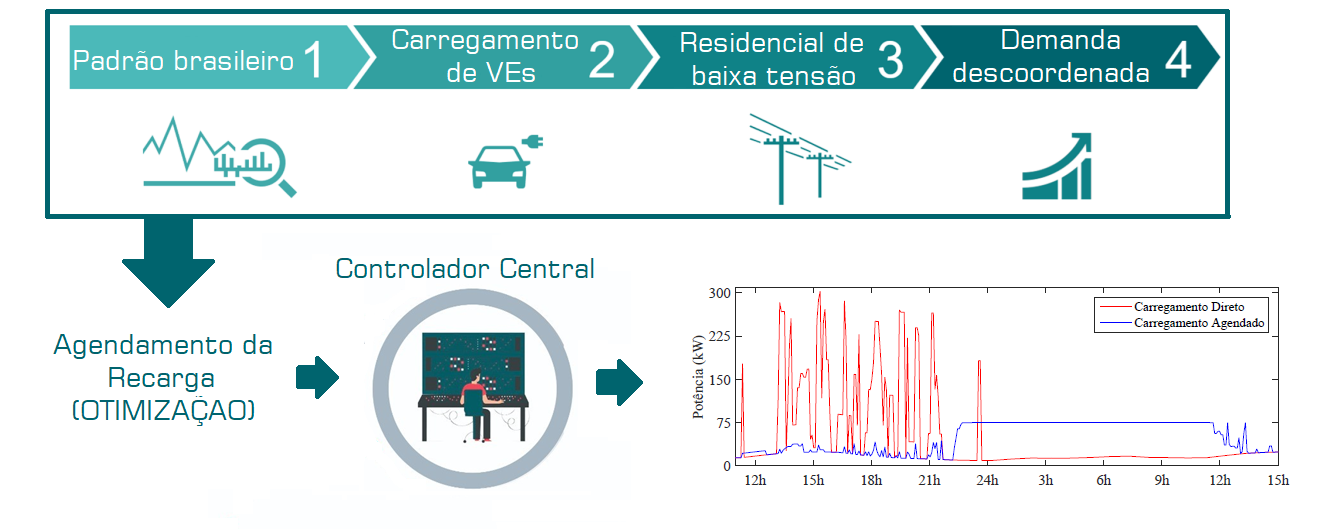Residential Charging Scheduling of Electric Vehicles in Brazilian Context
Keywords:
Electric Vehicles, Charging Scheduling, Optimization, Transformer LoadingAbstract
This paper presents a methodology to schedule the charging of Electric Vehicles (EVs) in order to maintain the loading of distribution transformer under the nameplate load while reducing charging costs. Brazilian consumption characteristics, mobility pattern and tariff structure are considered to design an optimization algorithm. While the demand of dwellings are estimated from typical load curves of a distribution utility located in the South of Brazil, the demand of EVs are estimated from mobility survey data. Adopting the current Brazilian tariff structure, coefficients of the objective function are formulated in order to schedule the charging of EVs to satisfy the following goals: limit the power demand requested to the distribution transformer, cope the demand of EVs with lower demand of dwellings and reduce the charging costs. The results shows that, in addition to prevent the overloading of distribution transformer, the charging only occurs in periods of higher tariff when necessary, whereas most of it occurs during late night and early morning, corresponding to cost reduction by purchasing energy during lower tariff prices
Downloads
References
IEA, International Energy Agency, “Global EV Outlook 2020”, Paris, 2018.
J. Axsen, S. Goldberg, J. Bailey, “Electrifying Vehicles: Insights from the Canadian Plug-in Electric Vehicle Study”, Simon Fraser University, Jul., 201 p, 2015.
INL, Idaho National Laboratory, “Plugged In: How Americans Charge Their Electric Vehicles”, p. 1–24, 2015.
M. Amjad, A. Ahmad, M. H. Rehmani, T.; Umer, “A review of EVs charging: From the perspective of energy optimization, optimization approaches, and charging techniques”, Transportation Research Part D, v. 62, p. 386–417 Mar, 2018.
L. Yao, W. H. Lim, W. H, T. S. Tsai, “A Real-Time Charging Scheme for Demand Response in Electric Vehicle Parking Station”, IEEE Transactions on Smart Grid, v. 8, n. 1, p. 52–62, 2017.
Z. Xu, Z. Hua, Y. Song, W. Zhao, Y. Zhang, “Coordination of PEVs charging across multiple aggregators”, Applied Energy, v. 136, p. 582–589, 2014.
D. T. Nguyen, L. B. Le, “Joint Optimization of Electric Vehicle and Home Energy Scheduling Considering User Comfort Preference”, IEEE Transactions on Smart Grid, v. 5, n. 1, p. 188–199, 2014.
J. Meng, Y. Mua, H. Jia, J. Wub, X. Yu, B. Qua, “Dynamic frequency response from electric vehicles considering travelling behavior in the Great Britain power system”, Applied Energy, v. 162, p. 966–979, 2016.
J. Babic, A. Carvalho, W. Ketter, V. Podobnik, “Evaluating Policies for Parking Lots Handling Electric Vehicles”, IEEE Access, v. 6, p. 944–961, 2017.
N. G. Paterakis, M. Gibescu, “A methodology to generate power profiles of electric vehicle parking lots under different operational strategies”, Applied Energy, v. 173, p. 111–123, 2016.
J. F. Franco, M. J. Rider e R. Romero, “A Mixed-Integer Linear Programming Model for the Electric Vehicle Charging Coordination Problem in Unbalanced Electrical Distribution Systems”, IEEE Transactions on Smart Grid, v. 6, p. 2200-2210, 2015.
S. Vadi, R. Bayindir, A. M. Colak, E. Hossain, “A Review on Communication Standards and Charging Topologies of V2G and V2H Operation Strategies”, Energies, v. 12, p. 3748–3775, 2019.
J. Chynoweth, et al., “Smart electric vehicle charging infrastructure overview”, 2014 IEEE PES Innovative Smart Grid Technologies Conference, ISGT 2014, Washington, US, 2014.
Z. Wei, Y. Li, Y. Zhang, L. Cai, “Intelligent parking garage EV charging scheduling considering battery charging characteristic”, IEEE Transactions on Industrial Electronics, v. 65, n. 3, p. 2806–2816, 2018.
M. T. Turan, Y. Ates, O. Erdnic, E. Gokalp, J. P. S. Catalão, “Electrical Power and Energy Systems Effect of electric vehicle parking lots equipped with roof mounted photovoltaic panels on the distribution network”, Electrical Power and Energy Systems, v. 109, p. 283–289, Janeiro, 2019.
W. Tushar, C. Yuen, S. Huang, D. B. Smith, H. V. Poor, “Cost Minimization of Charging Stations With Photovoltaics : An Approach”, IEEE transactions on Intelligent Transportation Systems, v. 17, n. 1, p. 156–169, 2016.
J. P. Sausen, A. R. Abaide, O. M. Adeyanju, J. L. Paixão, “EV Demand Forecasting Model Based on Travel Survey: a Brazilian Case Study”, 2019 IEEE PES Innovative Smart Grid Technologies Conference - Latin America, Setembro, 2019.
CNT, Confederação Nacional Do Transporte; NTU, Associação Nacional Das Empresas De Transportes Urbanos, “Pesquisa Mobilidade da População Urbana 2017”, Brasília, Agosto, 2017.
A. Mohamed, V. Shalehi, T. Ma, O. A. Mohammed, “Real-Time Energy Management Algorithm for Plug-In Hybrid Electric Vehicle Charging Parks Involving Sustainable Energy”, IEEE Transactions on Sustainable Energy, v. 5, n. 2, p. 577–586, 2014.
M. S. Kuran, L. Iannone, A. C. Viana, “A smart parking lot management system for scheduling the recharging of electric vehicles”, IEEE Transactions on Smart Grid, v. 6, n. 6, p. 2942–2953, 2015.
ANEEL, Agência Nacional De Energia Elétrica, “Resolução Homologatória no 2.272, de 18 de Julho de 2017”, Brasília, 2017.
DEMEI, Departamento Municipal de Energia de Ijuí, “Relatório campanha de medidas e caracterização da carga - 4CRTP”, Ijuí, RS, Brasil, 2016.
R. Guo, L. Lu, M. Ouyang, X. Feng, “Mechanism of the entire overdischarge process and overdischarge-induced internal short circuit in lithium-ion batteries” Nature: Scientific Reports, v. 6, Jul., p. 1–9, 2016.
J. Czyzyk, M. P. Mesnier, and J. J. Moré, “The NEOS Server”, IEEE Journal on Computational Science and Engineering v. 5(3), p.p. 68-75, 1998.


